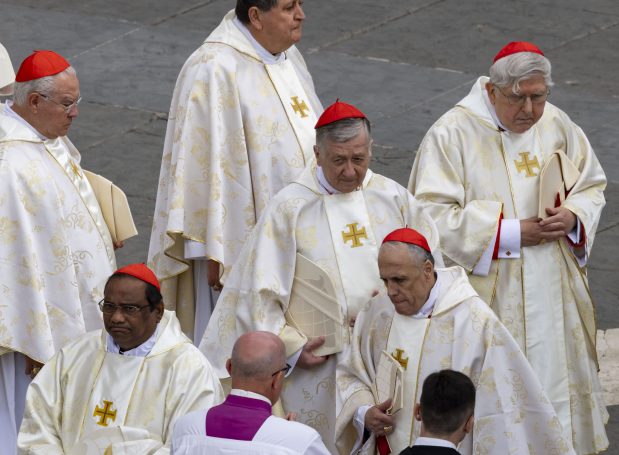A coalition of activist groups planning a massive protest at the Democratic National Convention in Chicago next week are crying foul after Mayor Brandon Johnson’s administration issued last-minute denials of requests to set up stages and sound systems for rallies in parks near the United Center.
In an emergency petition filed in U.S. District Court late Wednesday, the Coalition to March on the Democratic National Convention, which has a pending civil rights lawsuit against the city over protest preparations, called the move a bait-and-switch violation of their constitutional rights.
“The city’s efforts to deny at this late date the plaintiff’s request for a stage and sound amplification system so speeches can be heard unreasonably burdens plaintiff’s First Amendment rights without the city creating a record that such restrictions serve a compelling governmental interest,” the motion stated, asking U.S. District Judge Andrea Wood to intervene.
The group is planning to hold a news conference at City Hall on Thursday morning ahead of a hearing in the federal lawsuit at 1:30 p.m. A rally at City Hall was scheduled for later in the day.
The latest controversy comes just days away from the kick-off of the convention after the city responded by letter to two permit requests that have been pending for more than seven months to be able to install stages and sound equipment as well as portable toilets and other amenities in Union Park and another smaller park along the planned protest route.
The letter, which was attached to the emergency motion, stated the rally petitions were granted “subject to the following conditions: no stages or platforms, portable restrooms or toilets, tents or canopies, or sound equipment may be installed by your organization.”
The city said it was going to provide a stage and amplified sound at one of the parks which will be used by multiple organizations during the four-day event, and that allowing other groups to bring in their own equipment would be “redundant.”
The letter, signed by Chicago Department of Transportation Assistant Commissioner Bryan Gallardo, also cited myriad safety concerns, as tents and porta potties can be used to conceal weapons or other illegal activity and their materials can be broken down and used as weapons against the police.
“While CDOT is not suggesting that your particular group will use these items in these ways, their presence in the park could be abused by others to harm members of the public or law enforcement officers,” the letter read.
In their nine-page motion for an injection, however, the activist groups say the real motive for the last-minute, “made-up process” was to try and silence their protests against the Israeli military action in Gaza and other concerns. Activists have estimated that as many as 20,000 participants from across the country could be in Chicago for the event.
“The DNC has an interest in minimizing the exposure of Democratic officials to protests, particularly around the issues plaintiffs seeking to protest,” the motion stated. “The reason the city is denying … the opportunity to use stages and a sound system is because, at the behest of the DNC, they do not want the speeches heard.”
The issue over the planned rallies is one of the final sticking points in the long-running efforts to gain access to areas “within sight and sound” of the United Center, which is serving as the main convention center.
Earlier this week, Wood ruled that she will not force City Hall to widen and lengthen the protest route near the United Center, writing the city has a “significant government interest” in controlling the expected crowds for safety and security.
In her 24-page decision, Wood wrote the challenges to the alternate parade route proposed by the city “boil down to a complaint” that City Hall hasn’t offered “the exact route plaintiffs desire,” even though that route “allows them to speak near their intended audience.”
“This falls well short of a First Amendment violation,” Wood wrote. “As such, the alternative parade route represents an adequate alternative channel of communication.”
The route, proposed by Mayor Brandon Johnson’s administration last month, calls for protesters to assemble in Union Park on the Near West Side before marching west along Washington Boulevard to Hermitage Avenue, then past a small park north of the United Center. The route then turns east on Lake Street back to Union Park.
The march’s organizers had been fighting for a wider, longer path to the convention center, including being allowed to stay on Washington Boulevard instead of being diverted to smaller side streets. Other sticking points continue to be where and when the groups involved will be able to stage a rally near the United Center.
The two sides were still at odds in court last week, with plaintiffs’ attorney Chris Williams telling the judge they were “blindsided” by the possibility that they might not be able to hold speeches in a park two blocks north of the United Center.
Williams vowed to keep fighting for a plan for marches and speeches he argued would be safer than what the city has proposed and better align with his clients’ First Amendment rights.
“The way the city is doing this is take-it-or-leave-it, ‘you do what we say,’” Williams told Wood at the hearing on Aug. 5. “It’s not enough to say, ‘You have a route, you’re going to live with it.’ You’re going to have chaos.”
At the most recent hearing on Tuesday, the judge said she could see why the city’s last-minute maneuvering could be a cause for concern for the plaintiffs.
“It does seem a bit odd to me that the park permit applications have been pending so long without a response,” Wood said.
jmeisner@chicagotribune.com




